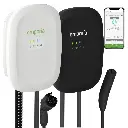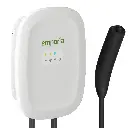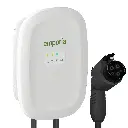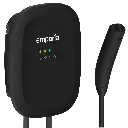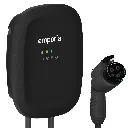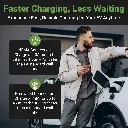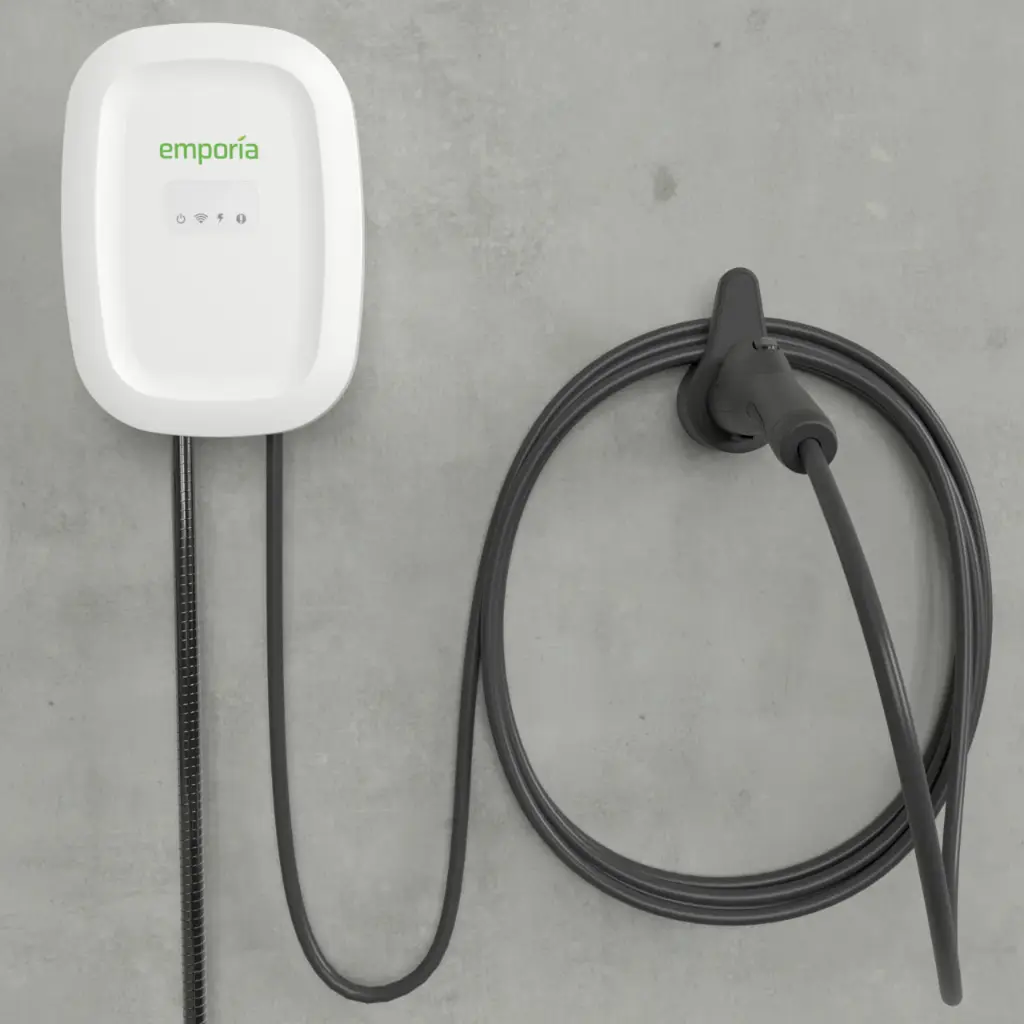Emporia Level 2 EV Charger:
Award-Winning Performance: Named "Best EV Charger of 2024" by top industry reviewers for unmatched design, power, reliability, and price.
Fast, Reliable, and Safe Charging: Up to 48 amps of power for swift, consistent charging across all EV models. GFCI-protected.
Save Money with Smart Scheduling: Control and monitor remotely with our free mobile app and save money with automated charging during lower-cost utility periods.
Experience fast, smart EV charging and save
Speed and Power
Swift and efficient charging for all-electric vehicle models. Maximum power of up to 48 amps with a hardwired setup or 40 amps with a NEMA 14-50 outlet.
Savings
Save up to 30% on charging costs with Time of Use smart scheduling during off-peak hours.
Top-Rated Durability
Reliable, fast, and consistent charging performance. Durable and top-rated for indoor or outdoor installation - NEMA 4 rated.
Smart Charging with Mobile App
Customize your charge settings, see real-time charging rate, and manage schedules remotely.
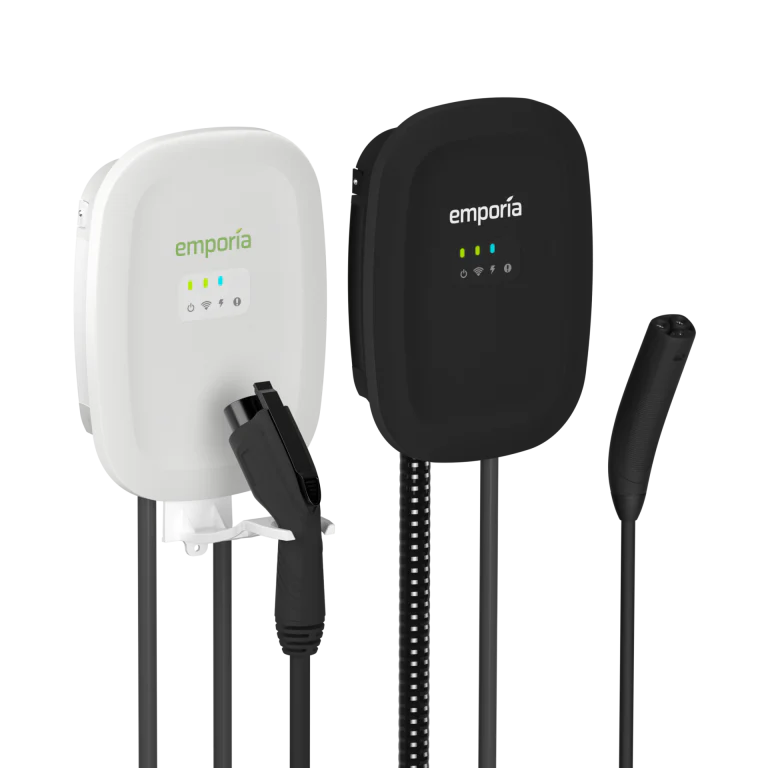
How to pick the right EV charger
Deciding between the NEMA 14-50P plug and the hardwire connection depends on several factors:
Existing Electrical Setup: If you already have a NEMA 14-50 outlet, using the plug is the simplest and most cost-effective option. If not, you may need to factor in the cost of installing this outlet.
Desired Charge Rate: Consider your vehicle's charging capabilities. Some vehicles cannot utilize the full 48A provided by a hardwired connection, making the 40A from a NEMA outlet sufficient.
Installation Flexibility: The NEMA plug offers greater flexibility for relocating the charger in the future. The hardwire option is better suited for a fixed installation where you do not anticipate moving the charger.
Local Electrical Codes: Always check local electrical codes and regulations to ensure compliance with safety standards.
Installation Cost: While the NEMA plug may have a higher upfront cost due to the need for a specialized outlet and GFCI breaker, the overall installation cost is often lower than a hardwired setup, especially if you already have the outlet installed.
Maintenance and Wear: Frequent plugging and unplugging of the NEMA outlet can cause wear over time. Hardwired installations eliminate this issue, providing a more durable connection.
Future Upgrades: If you plan to upgrade your electric vehicle or charging needs in the future, a hardwired installation might provide more flexibility in terms of accommodating higher charge rates.
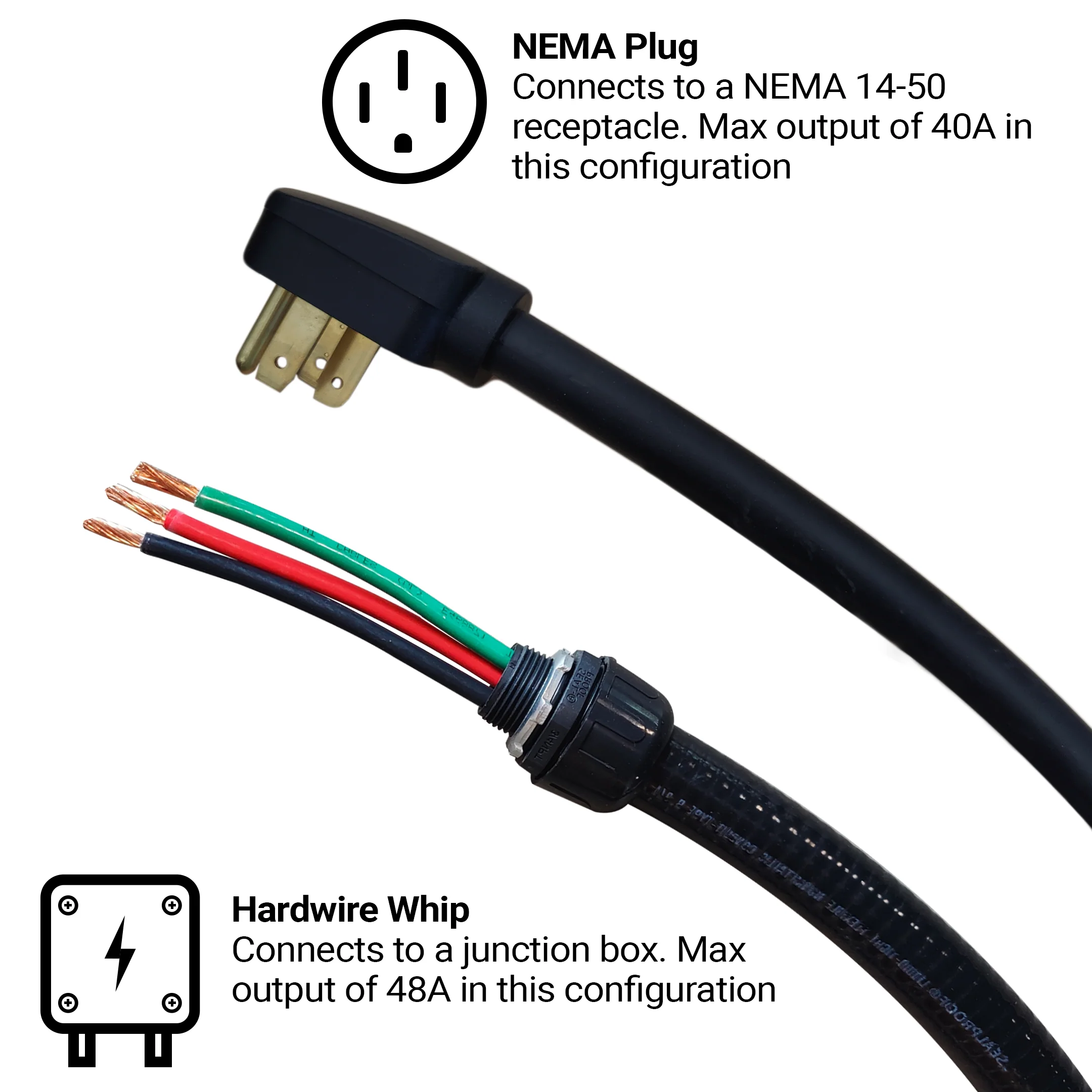
Additional information
Technical Specifications
Input Voltage 208/240VAC 50/60Hz
Power Charge 11.5kW (240V/48A) / 9.6kW (240V/40A) /
10kW (208V/48A) / 8.3kW (208V/40A)
Required Breaker Dedicated 50A+ dual pole for 40A
Dedicated 60A+ dual pole for 48A
Connector 24’ cable SAE J1772 connector
Power Wiring NEMA Type 14-50P (up to 40A) with 24" cable
compliant with 2017 NEC Section 625.17(A)(3) /
Hardwired (up to 48A) Enclosure
Enclosure Watertight NEMA Type 4 indoor/outdoor
Temp Range -22°F to 122°F (-30°C to 50°C)
Safety Features
Ground Fault Interrupt 15mA to 20mA trip sensitivity to protect against electric shock.
Internal Temperature Charging station internal temperature is continuously
monitored and shut off if the board temperature exceeds 98° C.
Missing Ground Detection Safety ground is constantly monitored during operation.
Charging is shut off if the ground is missing.
Pilot Signal EV connector / cable is de-energized when exposed to a strain that could result in the exposure of live parts.
Power Interlock EV connector / cable is de-energized when uncoupled from EV.
Self Check Sequence performed during start up, every three hours, and
before charging to ensure unit is working properly and safely upon power-up.
Stuck Relay Detection Check to ensure relays are functioning properly and providing proper power gating.
Surge Detection Constantly monitors for power surges during operation.
Charging is shut off if a surge is detected.
Vehicle Ventilation Required Checks for ventilation requests from EV, which are not supported, and stops delivering power to the vehicle.
Certifications
NEC 625 Electric Vehicle Charging System Equipment
SAE J1772 Electric Vehicle Conductive Charge Coupler Standard
UL 817 Cord Sets and Power-Supply Cords
UL 991 Safety Tests for Safety-Related Controls Employing Solid-State Devices
UL 2231 Standard for Personnel Protection Systems for Electric Vehicle Supply Circuit
UL 2251 Standard for Plugs, Receptacles and Couplers for Electric Vehicles
UL 2594 Standard for Electric Vehicle Supply Equipment
GFCI Protection
The National Electrical Code (NEC) now requires a GFCI breaker installed on any circuit using a 6-50 or 14-50 outlet. Since the Emporia EV Charger already has built-in GFCI protections, it can cause false/unwarranted tripping when installed on a line with GFCI protections also provided on the breaker.
Your electrician will be able to provide the best information for your installation scenario. If GFCI breaker installation is a requirement for your installation, then we recommend using the hardwired installation method since that is not required to be GFCI protected in the same way the NEMA outlet is. Due to conflicting requirements between NEC (NFPA70) and UL certifications related to the behavior of GFCI operations on EV Charging equipment, we can't provide more specific installation recommendations since it will depend on your location and you should consult your professional installer for more details.
